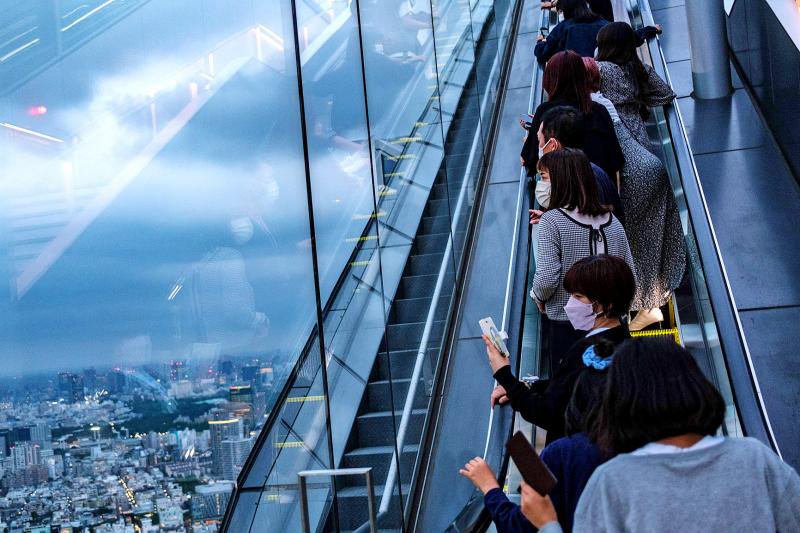More than 90 percent of Japanese believe Japan should prepare for a Chinese invasion of Taiwan, a Nikkei poll released on Monday found.
On how to prepare for an invasion of Taiwan, 41 percent of respondents said Japan should improve its capability of responding to a conflict in Taiwan by revising its laws, while 50 percent said the country should prepare within the existing legal framework and 4 percent said preparations are not needed.
In addition, 56 percent of respondents approved of a proposal by the Liberal Democratic Party-led government to increase the defense budget to 1 percent of Japan’s GDP, while 31 percent disapproved, marking little change from a poll last month.

Photo: AFP
About 60 percent of respondents agreed with preserving a military capability to strike back at an enemy — twice as many as the 30 percent who opposed the notion.
Under current Japanese law, Japan may exercise the right to self-defense if it or a close ally, such as the US, came under military attack.
However, Tokyo lacks the legal authority to build up stockpiles or render other military assistance to its allies unless the emergency is formally recognized, Yoji Koda, former commander-in-chief of the Japanese Self-Defense Fleet, was cited as saying.
Russia amassed forces near the borders of Ukraine before invading, which suggests a similar military buildup would precede a military invasion of Taiwan, he said.
That Japan “has no law that allows the US military to temporarily stockpile huge amounts of fuel and ammunition during normal times” might impede Japan’s ability to provide logistical support for US operations throughout the Indo-Pacific region, he added.
The poll, conducted by Nikkei Research from Friday through Sunday by telephone among Japanese men and women aged 18 or older, drew 935 valid samples and had a response rate of 41.4 percent.

MAKING WAVES: China’s maritime militia could become a nontraditional threat in war, clogging up shipping lanes to prevent US or Japanese intervention, a report said About 1,900 Chinese ships flying flags of convenience and fishing vessels that participated in China’s military exercises around Taiwan last month and in January have been listed for monitoring, Coast Guard Administration (CGA) Deputy Director-General Hsieh Ching-chin (謝慶欽) said yesterday. Following amendments to the Commercial Port Act (商港法) and the Law of Ships (船舶法) last month, the CGA can designate possible berthing areas or deny ports of call for vessels suspected of loitering around areas where undersea cables can be accessed, Oceans Affairs Council Minister Kuan Bi-ling (管碧玲) said. The list of suspected ships, originally 300, had risen to about 1,900 as

Japan’s strategic alliance with the US would collapse if Tokyo were to turn away from a conflict in Taiwan, Japanese Prime Minister Sanae Takaichi said yesterday, but distanced herself from previous comments that suggested a possible military response in such an event. Takaichi expressed her latest views on a nationally broadcast TV program late on Monday, where an opposition party leader criticized her for igniting tensions with China with the earlier remarks. Ties between Japan and China have sunk to the worst level in years after Takaichi said in November that a hypothetical Chinese attack on Taiwan could bring about a Japanese

MORE RESPONSIBILITY: Draftees would be expected to fight alongside professional soldiers, likely requiring the transformation of some training brigades into combat units The armed forces are to start incorporating new conscripts into combined arms brigades this year to enhance combat readiness, the Executive Yuan’s latest policy report said. The new policy would affect Taiwanese men entering the military for their compulsory service, which was extended to one year under reforms by then-president Tsai Ing-wen (蔡英文) in 2022. The conscripts would be trained to operate machine guns, uncrewed aerial vehicles, anti-tank guided missile launchers and Stinger air defense systems, the report said, adding that the basic training would be lengthened to eight weeks. After basic training, conscripts would be sorted into infantry battalions that would take

DEEP-STRIKE CAPABILITY: The scenario simulated a PLA drill that turned into an assault on Taiwan’s critical infrastructure, with the launchers providing fire support Taiwan yesterday conducted this year’s first military exercises at Longsiang Base in Taichung, demonstrating the newly acquired High Mobility Artillery Rocket System’s (HIMARS) ability to provide fire support and deep-strike capabilities. The scenario simulated an attack on Penghu County, with HIMARS trucks immediately rolling into designated launch areas and firing barrages at the Wangan (望安) and Cimei (七美) islands, simulating the provision of fire support against invading forces. The HIMARS are supposed to “fire and leave,” which would significantly increase personnel and equipment survivability, a military official said. The drill simulated an exercise launched by the Chinese People’s Liberation Army (PLA) Eastern